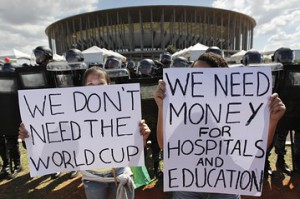
Brazil: The demonstrations are starting to turn violent. The day after the government revoked the transportation fare increases the demonstrations swelled again and engaged in more aggressive clashes with police.
President Dilma Rousseff decided to call off a visit to Japan that was planned for next week. The forthcoming visit by Pope Francis might also have to be rescheduled if the demonstrations continue.
In Rio de Janeiro riot police fired tear gas and rubber bullets at groups of masked young men trying to approach the City Hall late on Thursday. At least 29 people were reported to be injured in the clashes.
Some reports suggest about 300,000 people were taking part in an anti-government rally in the city. One news service reported more than 800,000 people participated in demonstrations in the major Brazilian cities
Comment: The polling agency, Datafolha, published its findings from a poll of the demonstrators in Sao Paulo yesterday. More than half of the demonstrators are under 25. Seventy-seven percent have higher education. Eighty-four percent back no political party, suggesting they do not vote.
The dominant issue for more than half was the fare increase which has been withdrawn. Corruption, a better transportation system, against all politicians and against violence and repression were distant other issues.
What the poll and anecdotal reports indicate is that the beneficiaries of Brazilian prosperity are protesting. The poll found no poor or disadvantaged people and few unemployed among the protestors. Brazil has low unemployment even for workers under age 25. The protestors have no organization or leadership. They gather by cell-phone notification. Expect the demonstrations to expand this weekend and become more violent.
Phi Beta Iota: Despite Brazil's huge advantages — it is one of the eight demographics certain to dominate the future — its government remains corrupt and ignorant. The protests over the fare hike have served as a precipitant to revolution, showing the middle class — always the catalyst for revolution, never the poor — that with cell phones they can aggregate effectively. Now they are realizing that every corrupt government decisions deprives them of access to wealth that is rightfully theirs. Brazil continues — as most governments continue — to be governed for the benefit of the few at the expense of the many. It is the middle class, armed with cell phones, that will bring down corrupt governments. What continues to astonish us is the persistent ignorance and arrogance of governments — they seem to demand that public burn them to the ground before they will listen to reasonable alternatives for hybrid governance.
See Also:
2011 Thinking About Revolution in the USA and Elsewhere (Full Text Online for Google Translate)



